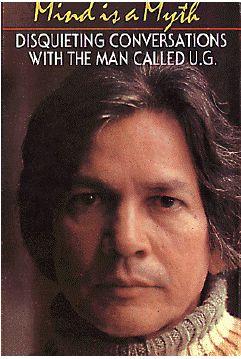Mind is a Myth is last of the three available books transcribed from talks with U.G. Krishnamurti. The first pages outline his extraordinary life and his calamity as he calls the all-changing transformation that took place on his 47th birthday:
“U.G. ceased to act any longer via the separative thought structure. A bit of energy entered his brain through one of the svery substance of inner anarchy. Being untouched by thought, which is time, it has nowhere to go and can find no escape from the stillness. A tremendous molecular pressure is built up that can have released only in an explosion. That explosion caused within U.G. the collapse of the entire thought structure and with it the notion of an independent self and an opposing society.”enses and was LEFT ALONE. A bit of energy left alone to vibrate freely, untranslated, uncensored, and unused by a separative, preemptive thought structure is a dangerous thing. It is the
Download Mind is a Myth by U.G. Krishnamurti here:
Interview with U.G. Krishnamurti in Gstaad, Switzerland, 1998:
U.G. Krishnamurti: A Life Beyond Conventional Thought
Uppaluri Gopala Krishnamurti, commonly known as U.G. Krishnamurti, was an enigmatic and unconventional spiritual figure whose teachings and personal philosophy defied traditional spiritual norms. Born on July 9, 1918, in Machilipatnam, Andhra Pradesh, India, U.G. embarked on a lifelong quest for truth that led him to reject all established systems of thought and spirituality.
U.G. was raised in a Brahmin family with a strong religious and philosophical background. His grandfather, a staunch Theosophist, played a significant role in his early education, exposing him to the teachings of prominent spiritual figures, including Jiddu Krishnamurti (no relation), a renowned spiritual leader of the time. Despite these influences, U.G. was never fully satisfied with conventional answers to life’s profound questions.
Quest for Enlightenment
In his twenties, U.G. Krishnamurti delved deep into the spiritual practices and philosophies of various traditions, including Theosophy, Zen Buddhism, and Vedanta. However, his relentless search led him to a pivotal moment in 1967, often referred to as the “Calamity,” where he experienced a profound shift in consciousness. U.G. described this experience as a physiological transformation that left him in a state of “natural” living, free from the constructs of the mind and societal conditioning.
Teachings and Philosophy
U.G. Krishnamurti’s teachings were starkly different from those of conventional spiritual leaders. He dismissed the notion of enlightenment as an achievable goal and criticized spiritual gurus and systems that promised liberation. According to U.G., enlightenment is a myth, and the pursuit of it only leads to further confusion and suffering. He emphasized that the body and mind are inherently intelligent and capable of functioning naturally without the interference of thought or the self.
U.G. rejected the guru-disciple relationship and discouraged followers from forming around him. He believed that each individual must find their own path without relying on external guidance or authority. His dialogues were often provocative and challenging, aimed at dismantling deeply held beliefs and assumptions.
Legacy
U.G. Krishnamurti spent much of his later life traveling and engaging in discussions with individuals from various backgrounds. He lived a nomadic lifestyle, residing in different countries, including India, the United States, Switzerland, and Australia. Despite his controversial stance, U.G. attracted a diverse group of listeners who were drawn to his radical perspective on life and spirituality.
U.G. Krishnamurti passed away on March 22, 2007, in Vallecrosia, Italy. His teachings continue to provoke thought and inspire individuals to question their beliefs and explore life beyond the confines of traditional spirituality. Through his radical approach, U.G. left an indelible mark on the landscape of contemporary spiritual thought, challenging seekers to confront the fundamental nature of their existence.

Delusional angry man who has to to right and never questioned seriously.
I like so much of what UG says. Almost all of it. It’s when he says that after the mind stopped and some sensory data got in there and was left alone that some molecular changes happened and there was an explosion. I think he actually means a physical explosion. So, that put me off. That’s about, well, I think that is the only thing I didn’t like from the man after reading a half dozen books and watching dozens of his videos.
Definitely worth finding some of his videos at youtube. :P
With metta,
Vern L
Thought is not only an enemy but also a friend.